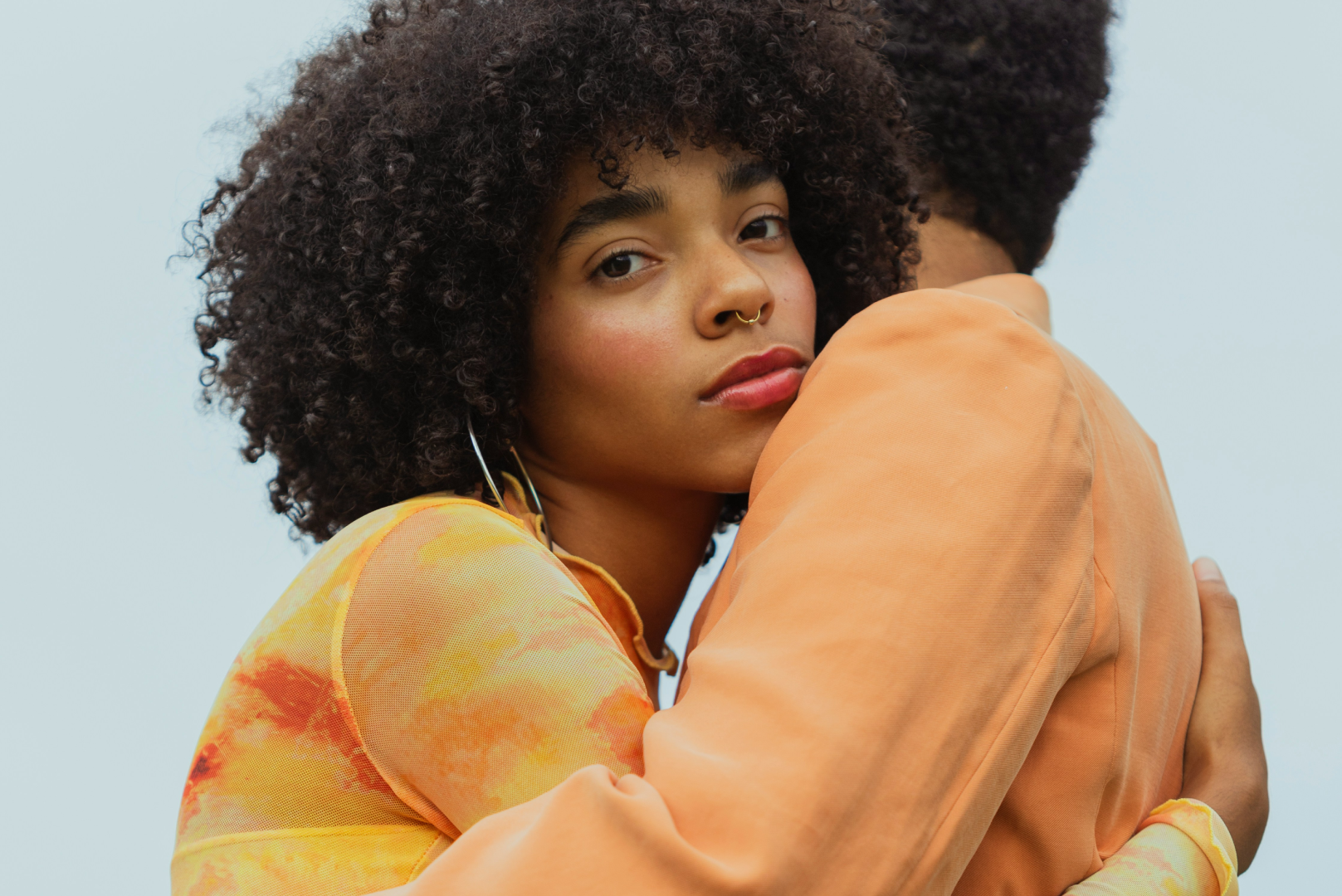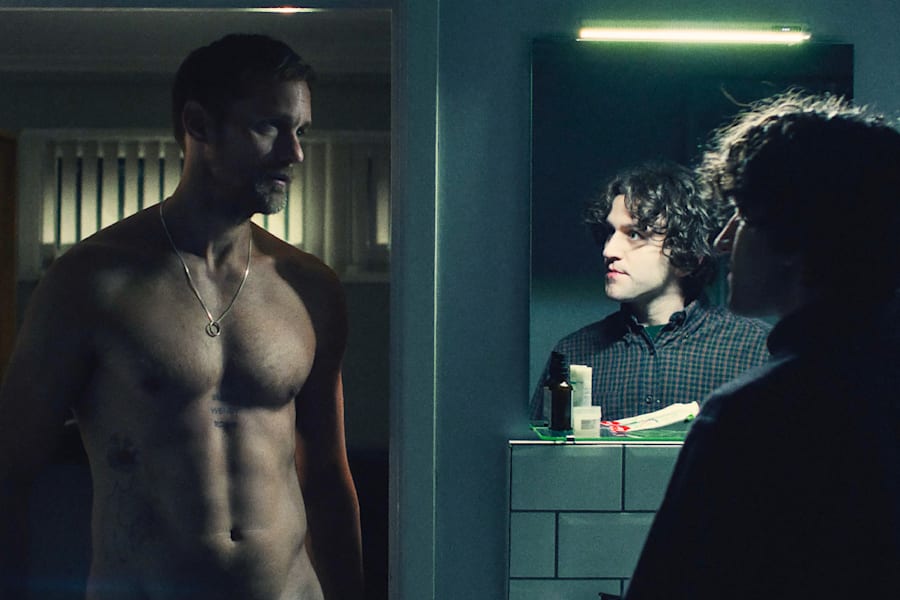Is having a boyfriend embarrassing now? How to get over relationship cringe

On choosing connection over curation, and becoming comfortable with vulnerability.
When British Vogue recently asked, “Is having a boyfriend embarrassing now?”, the internet didn’t hesitate to answer. Focusing specifically on the experience of women dating men, TikTok, X, Reels—even Reddit—quickly spiralled into jokes about being “caught texting a man,” performing mock shame while holding hands in public, or queer women celebrating their immunity to it all. It was light-hearted, of course, but it hit a cultural nerve. To be clear: it’s not having a boyfriend that feels embarrassing, it’s being publicly defined by one.
Chanté Joseph, the writer of the original piece, argued that women who date men are quietly renegotiating what relationships look like, both online and off. For years, being “the girlfriend” was social currency—proof of desirability and emotional success. Now, that logic feels dated. As Vogue put it, “There’s been a pronounced shift in the way people showcase their relationships online: far from fully hard-launching romantic partners, straight women [and those who date men] are opting for subtler signs—a hand on a steering wheel, clinking glasses at dinner, or the back of someone’s head.” These soft launches and cropped clues suggest not shame, but strategy. A new form of emotional PR.
Because the truth is, we’re living through a cultural renaissance of girlhood and, indeed, womanhood. While the conversation digs into some complex perspectives around heterofatalism, and women choosing the freedom of being single, it also raises some relatable questions about being perceived in a relationship, especially on social media—and particularly in monogamous dynamics. Is constantly posting your partner kind of cringe? Does it come across as out of touch when the dating landscape is so demoralizing for many? Is it a form of public shame to post about someone who could later go on to embarrass you? And is it just a bit lame to seem so obsessed with your partner, especially a boyfriend?
Beneath the memes lies something deeply human. We still crave connection, but are we resistant to public vulnerability? What’s more, in the context of rejecting prescribed scripts, being publicly defined by a relationship can feel like a step backward.
Of course, we don’t have all the answers. But, when it comes to that icky feeling around publicly sharing your relationship, we’re digging into what we might call “relationship cringe.” Why do we feel it? And how can we move through it without losing the sincerity that makes connection worth sharing in the first place?
What is relationship cringe?
Relationship cringe is largely to do with your feelings around how your relationship is perceived by others. It’s less about how you feel toward your partner when you’re alone, and more to do with the act of publicly sharing your relationship, and how that might look to others.
As Niki Davis-Fainbloom, an NYC-based sex educator and writer, explains: “Relationship cringe is the feeling of embarrassment or discomfort that arises—often when you or your partner do or say something that feels overly sentimental, awkward, or performative. It can show up when your partner calls you ‘snuggle muffin’ in front of friends, wears Crocs outside, or posts too many Insta stories.”
Relationship coach Rich Heller adds, “Relationship cringe—that self-conscious feeling that love, commitment, or even being visibly partnered might somehow make you look less independent, less edgy, or too earnest can be pervasive. It’s not that people are suddenly ashamed of affection; it’s that we’ve started equating vulnerability with loss of status. We live in a culture where self-sufficiency is glorified and irony is a form of armor, so sincerity—especially romantic sincerity—can feel risky.”
Still, it’s not always that simple. For some people, that cringe feeling of sharing their relationship publicly could stem from knowing that things aren’t quite right. As Feeld member Rhiannon, a 30-year-old bisexual woman, shares: “As someone who was a certified dating connoisseur for many years prior to getting into my relationship, I can confidently say that relationship cringe is a thing. If you’re with the wrong person, that is.”
Why do we experience relationship cringe?
Whatever your take on it, the Vogue piece captured something quietly contradictory about modern womanhood specifically, suggesting that “women don’t want to be seen as being all about their man, but they also want the clout that comes with being partnered up.”
It’s a tension Rhiannon recognizes all too well. “We’re a society ruled by icks,” she says. “It’s not cool to brag about anything, and I guess relationships fall into that too. When I was single, I thought it’d be embarrassing to be too into someone. I wanted to retain strong independent woman status, and convinced myself that being soppy would strip that away.”
So what gives?
Sometimes, the cringe we feel isn’t about our partner at all, but about how affection is expressed. Niki explains, “If you [feel cringed out by] your partner, meaning their behavior makes you feel secondhand embarrassment or discomfort, it [might] point to a clash in expression styles, not necessarily incompatibility.” She adds that these differences can make us second-guess ourselves: “When your partner’s way of expressing love feels cringey, it can trigger self-consciousness or highlight insecurities about being seen as too much or too little.”
That internal self-consciousness can be amplified by the culture we live in. Sophie Takooree, co-founder of Our Guilty Pleasures, believes it’s “because culture celebrates the chase and fades to black once love begins,” she says. “From dating shows to rom-coms, the narrative often ends when comfort starts, so when real relationships settle, we mistake safety for dullness. It’s not boredom with our partner; it’s boredom with predictability.”
According to Rich, it can run even deeper. “People experience relationship cringe because being partnered makes us visible in ways we can’t control,” he says. “Our partners become mirrors we can’t edit. That can trigger fears about judgment, identity, or being ‘basic.’ It’s a modern version of the same old human worry: what will people think of me if I let them see I care this much?”
For queer people, that discomfort can carry additional layers. Feeld member Rhiannon, who identifies as bisexual, says her own feelings of cringe were shaped by identity and perception. “After years of mainly dating women, I never expected to be in a relationship with a straight white man. I found myself feeling a bit embarrassed to tell my queer friends, but that’s gone away over time.”

How to deal with relationship cringe
If "relationship cringe" is the new emotional ick, the cure isn't to delete your couple selfies or pretend you're too cool to care. It's to get curious about why it bothers you in the first place. Because often, what we call cringe is really just vulnerability misunderstood.
Pay attention to what triggers you
"Identify what makes you cringe: the act itself, or how you fear others might perceive it," advises Niki. Maybe it's not the hand-holding or the pet names that feel uncomfortable, but the imagined audience watching it play out on social media, or in person. She suggests we "Focus on the love or vulnerability behind their behavior, instead of judging the presentation. Think, 'this is my partner being authentically them,' not 'this is embarrassing.'"
If something really doesn't sit right, Niki says communication is key. "You can express it gently without shaming them."
Stay curious
Sophie believes that curiosity is "the antidote to cringe." It’s the quality that turns routine into renewal and keeps long-term connection from feeling like a chore, or a performance.
"Desire evolves, and so do people," she says. "Keep rediscovering your partner through play, conversation, and shared novelty,” she adds, suggesting to “treat [your] relationship like something worth exploring, not maintaining."
Get comfortable with being vulnerable
“When doubts or cringe come up, get curious,” Rich suggests. “What exactly feels threatening about being seen as someone in love?"
"[Sometimes] it's not about the partner at all, it's about our relationship with visibility and vulnerability," Rich adds, suggesting that focusing on connection over performance can mean “the embarrassment falls away.” What’s more, he says that both trying to hold back from intimacy, or trying to convince yourself of a connection, can also make a relationship feel embarrassing—suggesting that love may feel cringe “when we're trying to keep it at arm's length, or when it's something else, masquerading as love."
Lean into positive relationship content
When your For You Page is full of "pranking my boyfriend" videos, BookTok fantasies, ick reveals, or couples performing for the algorithm, it's no wonder relationship content can start to feel cringeworthy. Social media thrives on comparison, and that can skew how you read even the simplest displays of affection, including your own.
But your feed isn't fixed. Curating it toward positive, authentic relationship content can help reset how you feel about posting your partner online.
Take TikTok’s “I didn’t marry a loser” trend: people sharing moments with their partners like splitting house chores, doing couples fancy dress, looking after them when they’re sick, or joining in with something they care about, even if it’s not their thing—normalizing simple, everyday connection (and, let’s be honest, the bare minimum, in the best way). The same goes for the videos where someone shows their childhood fictional character or celebrity crush and then the person they ended up with. Spoiler: sometimes, when you know, you know.
Leaning into this kind of content can shift your mindset from "people overshare and it's embarrassing" to "people share because appreciating their partner, publicly, feels good." And once you change how you're consuming relationship posts, it becomes much easier to let go of the ick of sharing your own.
Accept that cringe can be a natural part of intimacy
Romance can be cringy sometimes, and that’s kind of the point. To love someone is to risk being seen in your most earnest, unfiltered moments. The same vulnerability that makes intimacy possible can also make it feel awkward at times. The goal isn't to eradicate cringe, but to see it as proof of aliveness, of choosing connection over curation.
It's something Rhiannon has come to embrace. "I'm sickeningly in love with my partner and have become their personal videographer and fangirl," she says. "I show them off at every given moment, and I don't feel bad about doing so. The right person will take up all the best parts of your heart, brain, and mind, rather than dim your light. I'm almost certain we're the definition of cringe, but the perfect thing is that I couldn't care less. I'm free of the cringe."
Of course, there’s still a broader conversation at hand about the future of relationships, particularly mono-heteronormativity and women’s experiences within that. But when it comes to the “icky” aspects of being perceived and in love, leaning into vulnerability can be a meaningful starting point. Part of that can involve meeting others who hold the same priorities and understanding about connection that you do—and you can find exactly that on Feeld. For more, dig deeper into curiosity, intimacy, and self-expression in Issue 002 of AFM, Feeld’s magazine.


